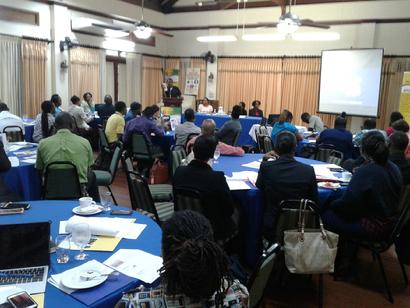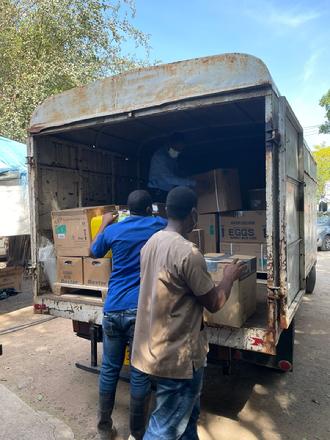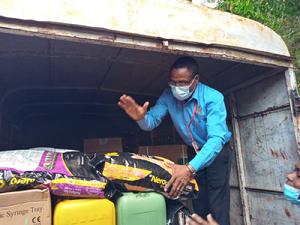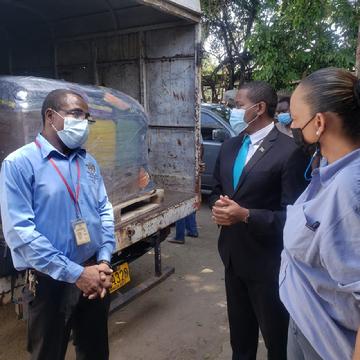| JVMA-CCFP-J One Health Virtual Conference 2024 |
|
CLICK HERE FOR PROGRAMME DETAILS
By registering for this conference, you agree that your personal information such as name. profession, email address, telephone contact and organization/place of work will be collected by the organizers and processed for purposes of the provision of Continuing Medical Education credits, statistical analysis of conference attendance, and announcements of future conferences . Your information will not be shared with any party outside of the conference structure without your consent. You may request that your personal information be deleted by contacting the conference organizers.
secretary@ jvma.org, onehealthdayconferencejamaica@gmail.com
|
| Dr. Sarah Wilkinson-Eytle elected CVA President |
 |
| Dr. Sarah Wilkinson-Eytle (right) President-elect of the Commonwealth Veterinary Association, is congratulated by current CVA President Dr. Olatunji Nasir (Nigeria). Dr. Eytle will assume the presidency in January 2024 |
|
| Dr. Sarah Wilkinson-Eytle, former JVMA president, former Caribbean Veterinary Medical Association (CbVMA) president and current Commonwealth Veterinary Medical Association (CVA) secretary has taken her international role to another level when she was elected president of the CVA at the recent CVA meeting in the United Kingdom. Dr. Eytle will assume the role in January 2024, replacing Dr. Olatunji Nasir of Nigeria who has been CVA president Since January 2020.
This is another "first" under the Dr. Eytle's belt - first female JVMA and CbVMA president, first Caribbean veterinarian in the CVA Executive (as secretary), and now first female CVA President.
Dr. Eytle, originally from Guyana, but making Jamaica her home for over three decades said: "It is an honour and a privilege to take on this role and I look forward to the challenge. I hope to represent Jamaica and the wider Caribbean to the best of my ability."
The new CVA Executive, which will hold office from 2024-27 will be:
- President - Dr Sarah Wilkinson-Eytle (Jamaica)
- Secretary - Dr Jeff Cave (Australia)
- Treasurer - Dr Dianne Philips (Australia)
- Programme Director - to be confirmed
- Immediate Past President - Dr Olatunji Nasir (Nigeria)
- Executive Director - Dr Abdul Rahman (India)
|
| In Memoriam: Dr. Suzan McLennon-Miguel |
 |
| Dr. Suzan McLennon-Miguel "Doc Sue" 1967-2023 |
|
| On July 8, 2023 shock and grief gripped the Jamaican and Caribbean Veterinary, Food Safety and Disaster Management communities as news spread of the passing of Dr. Suzan McLennon-Miguel, affectionately called Doc Sue. She passed away in Suriname at the age of 55 following a battle with cancer. She kept her illness private so few persons were aware, adding to the shock her passing brought.
Dr. Miguel had recently taken up a position with the Caribbean Agricultural Health & Food Safety Agency (CAHFSA) and moved to Suriname, on secondment from her position as Senior Veterinary Specialist in the Veterinary Epidemiology, Public Health & Food Safety (VEPHFS) Unit of the Veterinary Services Division of the Ministry of Agriculture, Fisheries & Mining. Food Safety and Disaster Management were her major interests and she worked tirelessly right to the end to advance those causes.
Dr. Miguel started her career in animal health as an Animal Health Assistant at the VSD, having attended the Regional Programme for Animal Health Assistants in Guyana, graduating in 1989. She went on to study Veterinary Medicine at the UWI School of Veterinary Medicine in Trinidad, graduating in 2002. She later completed her Masters in Public Health at UWI in Jamaica.
She was awarded the title of Civil Servant of the Year by the Jamaica Civil service Association in 2011, and carried out a project to establish "Happy Rooms" in children's hospital wards to help sick children heal by having place for play and learning while hospitalized. She was a Livestock Emergency Guidelines and Standards (LEGS) certified trainer, and led several workshops to train persons here in Jamaica. She was a major force in the establishment of a regional disaster response network for animals, following the volcanic ruption in St. Vincent in 2021.
Doc Sue is survived by her husband David Miguel. May she rest in peace.
|
NEED TO CONSULT A VET? FIND A VET NEAR YOU! Click HERE.
For the Jamaica Veterinary Board's List of Registered Vets Click HERE.
|
JAMAICA ON ALERT AS AFRICAN SWINE FEVER STRIKES THE DOMINICAN REPUBLIC
|
July 2021
The Veterinary Services Division of the Ministry of Agriculture & Fisheries, the veterinary community and the pig industry are on heightened alert as the highly contagious and dangerous disease African Swine Fever has broken out in the neighbouring Dominican Republic.
PLEASE NOTE: African Swine Fever has NOT been found in Jamaica or other Caribbean countries at this time. It is an OIE-reportable emergency disease with potentially devastating effects in pigs, and by extension, affecting food security and causing economic disruption. The virus does NOT infect humans.
Various stakeholder personnel and organizations, including veterinarians, livestock industry players, Customs, the Police and Military, Jamaica Post, NEPA and public health personnel, have been brought to increased vigilance.
For a recent news item covering information from the VSD, click HERE.
For the OIE’s latest information on ASFV please CLICK HERE.
ALL SUSPICIONS OF AN UNUSUAL ANIMAL DISEASE OF ANY TYPE SHOULD BE REPORTED IMMEDIATELY TO THE VETERINARY SERVICES DIVISION 876-977-2492, 876-977-2489, 876-927-0595 email: vsd@moa.gov.jm
HELP KEEP JAMAICA EMERGENCY DISEASE FREE! DO NOT IMPORT ANIMALS OR ANIMAL PRODUCTS WITHOUT A VALID VSD PERMIT!
|
 |
| Delegates at an African Swine Fever Seminar |
|
|
For a detailed look at African Swine Fever, presented by Prof. Chris Oura of the UWI School of Veterinary Medicine, St. Augustine, Trinidad, please Click HERE
Note: Prof. Oura is one of the world's premier experts on ASFV. We are fortunate to have him in our region.
|
REGIONAL RESPONSE TO THE ERUPTION OF LA SOUFRIERE VOLCANO IN ST. VINCENT & THE GRENADINES
CARING FOR ANIMALS
|
On Tuesday April 6, 2021, Dr. Coleen Phillips, Commonwealth Veterinary Association (CVA) Councillor for St. Vincent & the Grenadines posted in the CVA's Whatsapp group that the La Soufriere volcano in the north of the island of St. Vincent was preparing to erupt. Preparations for and explosive eruption, the likes of which had not been seen for over 40 years, were underway and although the safety of human beings was paramount, someone had to look out for the animals.
As news spread, virtual hands reached out from around the region. Feed for animals of all types, water, medication, shelter, storage containers were urgently needed.Support from World Animal Protection was sought and online meetings were held. Preparatory advice was given, outreach was made to various organizations for funding and logistical support. The region mobilized. St. Vincent prepared.
The threat level was raised to red on Thursday April 8 and evacuation of the "red zone" in the north of the island was ordered.
Then it happened. On the morning of Friday Aprl 9, La Soufriere exploded. A massive column of flaming ash and smoke billowed skyward into the atmosphere. Ash rained down from the sky, blanketing the island under inches. Upper level winds carried in mainly westward towards Barbados which soon found itself also being blanketed by falling ash. Day turned to night....
In the ensuing days, repeated explosive events followed. St. Vincent's veterinarians and their support staff braved the dangers to go out to help animals in need - whether they had been moved to safer locations or had been left in the red zone. Many had died. Others were covered in ash, without food or water. Those that could be helped were helped, but much more was needed.
|
 |
| Truck being loaded with supplies for animals in St. Vincent at the JSPCA on Tuesday April 13, 2021. |
|
|
 |
| Director of Veterinary Services Dr. Osbil Watson helping with the loading process. |
|
|
 |
| Minsister of Agriculture & Fisheries Hon. Floyd Green (centre) converses with Dr. Osbil Watson (left) and Mrs. Pamela Lawson (right), Managing Director of the JSPCA. |
|
|
From Guyana in the south to Belize in the west to the Bahamas in the north and so many islands and countries in between, veterinarians and animal welfare personnel, government agencies, universities came together to mobilize and send assistance. Hay, molasses, grain, pet food, water, storage containers, medication of various types were on the way.
In Jamaica, the JSPCA spearheaded the collection of supplies, the JVMA and the Ministry of Agriculture & Fisheries joined in and together, with help from ODPEM, they were able to get a truck-load shipped to St. Vincent aboard a Royal Bahamas Defence Force ship that had berthed in Jamaica briefly.
The JVMA wishes to thank everyone who has contributed cash or kind to this effort so far. More will be needed over time.
In times of need, we must be there for each other. Animal health and welfare is crucial to human health and welfare. In the name of the past project, it is indeed One Health, One Caribbean, One Love.
|
PRESENTATION ON THE COCKPIT COUNTRY - JAMAICA'S AMAZON
DR. SUSAN KOENIG D.F.E.S.
(Honourary Member of the JVMA)
Click link below to view)
|
| ANNUAL GENERAL MEETING SPONSOR
PLEASE CLICK ON THE LOGO TO THE LEFT TO VISIT
BOEHRINGER INGELHEIM
ANIMAL HEALTH
|
 |
| JVMA GENERAL MEETING SPONSOR - Click to visit the PFI website. |
|
|
 |
| Dr. Roberta Harris-Daley - JVMA Assistant Secretary |
|
| The Need for Sustained Veterinary Education.
Dr. Roberta Harris-Daley
Currently, there are approximately 87 veterinarians practicing in Jamaica, with the majority being employed in government regulatory work or private clinical practice (involving preventative medicine and the diagnosis and treatment of various illnesses in pets, food-producing animals and horses).
This figure represents a veterinarian: human population ratio of 1:30, 000 which is grossly inadequate, especially when compared to other neighbouring North American and Caribbean countries with ratios between 1 per 2000 and per 10, 000.
The inadequacy is blatantly seen in the lack of clinical veterinary services in many rural parishes, where farmers and pet owners are left without veterinary care for their animals, and has also led to the proliferation of illegal practitioners which poses a threat, not just to animal welfare, but also to food safety and human health.
READ MORE
|
Antimicrobial Resistance
FOR INFORMATION ON ANTIBIOTICS
AND
ANTIMICROBIAL RESISTANCE PLEASE VISIT OUR
WORLD VETERINARY DAY 2017 PAGE
IN THE DROP DOWN MENU ABOVE
|
Animal Health Matters is a new online resource that aims to educate and build greater awareness of the most pressing issues in animal and human health, including zoonotic disease, antimicrobial resistance, global food security and the future role and health of companion animals. Factors such as the impact of global conflicts, trade, how healthier animals mean healthier families and the ongoing focus on zoonotic disease are all debated within the new, attractive and interactive online resource.
Animal Health Matters was produced by the HealthforAnimals, the global animal medicines association, and the World Veterinary Association, the global voice of the veterinary profession to recognize that the health of our pets, farm animals and wide range of wildlife, is inextricably tied up with the health and wellbeing of human beings all over the world.
Animal Health Matters also looks to the longer term with items such as ‘Five trends for the next five years’, which assess the impact of new and emerging factors influencing animal health. These ‘Five trends’ include factors such as better surveillance systems for disease threat identification, how portable technologies are helping to fill the void in information about the movement and emergence of livestock disease, and how the role of new technologies, such as satellite data and smart ear tagging, are helping developed and developing nation farmers detect disease sooner.
To learn more about why animal health matters, or to sign up to the new monthly newsletter, visit www.animalhealthmatters.org .
|
VETERINARY POETRY
A tribute to the JAMAICA HOPE breed of cattle
THE LIFE OF A JAMAICA HOPE COW
by Dr. Olivia Scott
Click on the image to the right to read Dr. Scott's poem
| |
 |
| POSITION PAPER ON ANIMAL WELFARE - CLICK ON LOGO ABOVE |
|
|
 |
| Please click the logo to visit the WOAH website |
|
|
 |
| POSITION PAPER ON ONE HEALTH - CLICK ON LOGO ABOVE |
|
|
TRIBUTE TO A DOG
The one absolutely unselfish friend that man can have in this selfish world, the one that never deserts him, the one that never proves ungrateful or treacherous is his dog.
A man's dog stands by him in prosperity and in poverty, in health and in sickness. He will sleep on the cold ground, where the wintry winds blow and the snow drives fiercely, if only he may be near to his master's side.
He will kiss the hand that has no food to offer, he will lick the wounds and sores that come in encounter with the roughness of the world . He guards the sleep of his pauper master as if he was a prince. When all other friends desert, he remains.
When riches take wings and reputation falls to pieces, he is as constant in his love as the sun in its journey thru the heavens.
GEORGE VEST, 1870
|
Writer's Credit: Unless otherwise stated, all articles on this page are written by Dr. Paul Cadogan.
|
| For Archived News, go to on the News Archive drop-down menu at the top of this page. |
We want this web site to be one that will make all Jamaican veterinarians proud. It's still a work in progress. If you have any advice or you want to assist us in any way please email the Secretary of the Association. Click here to send us your advice and/or comments.
|
|